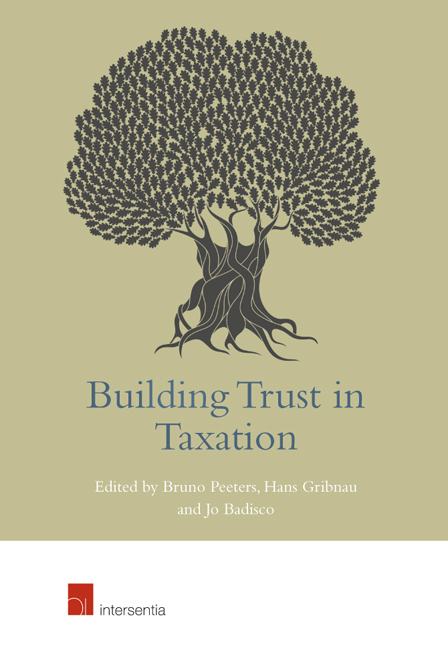Book contents
- Frontmatter
- Preface
- Contents
- List of Authors
- Introduction
- PART I TAXATION, STATE AND SOCIETY: RECIPROCITY AND THE LIMITS OF THE POWER TO TAX
- Voluntary Compliance Beyond the Letter of the Law: Reciprocity and Fair Play
- What is Wrong with Endowment Taxation: Self-Usership as a Prerequisite for Legitimate Taxation
- Is Taxation on a Par with Forced Labour?
- Conflict of Trust: EU Member States’ Fiscal Sovereignty and the Ideal of the Internal Market
- PART II Trust and morality: tax governance in need of transparency
- PART III International taxation: in search of democratic legitimacy
- PART IV Behavioural aspects of taxation and trust
What is Wrong with Endowment Taxation: Self-Usership as a Prerequisite for Legitimate Taxation
from PART I - TAXATION, STATE AND SOCIETY: RECIPROCITY AND THE LIMITS OF THE POWER TO TAX
Published online by Cambridge University Press: 21 September 2018
- Frontmatter
- Preface
- Contents
- List of Authors
- Introduction
- PART I TAXATION, STATE AND SOCIETY: RECIPROCITY AND THE LIMITS OF THE POWER TO TAX
- Voluntary Compliance Beyond the Letter of the Law: Reciprocity and Fair Play
- What is Wrong with Endowment Taxation: Self-Usership as a Prerequisite for Legitimate Taxation
- Is Taxation on a Par with Forced Labour?
- Conflict of Trust: EU Member States’ Fiscal Sovereignty and the Ideal of the Internal Market
- PART II Trust and morality: tax governance in need of transparency
- PART III International taxation: in search of democratic legitimacy
- PART IV Behavioural aspects of taxation and trust
Summary
ABSTRACT
Delmotte and Verplaetse connect the issue of trust to legitimacy: what are the ethical boundaries that citizens can entrust the legislator not to transgress? Moreover, a research-programme aiming to restore the relationship between taxpayers and their governments demands an identification of the limits to governmental taxing proclivities. Indeed, while normative tax theory focuses mainly on how to limit the productivity-loss due to taxation, this contribution scrutinises how to limit rightsviolations due to taxation.
To demonstrate the effect of peoples ‘ rights within fiscal processes, the authors raise the issue of endowment taxation. The concept of an endowment tax, being a levy on the market value of one ‘ s talent, is the showpiece of the dominant, welfare economist approach to taxation. Taxing people on their talents has been celebrated as a theoretic ideal – mainly since it avoids taxpayers ‘ minimising their tax debt by working less, and it thus maximises welfare.
However, both authors protest against the ideal of talent taxation, by showing how such a measure collides with the rights taxpayers have over their own person. From a more abstract notion of autonomy, they deduce the ‘ right to self-usership ‘, that claims that all people have at least the right to control their own body and mind. By analysing how a talent tax would be practically implemented, the authors reveal that such a policy violates this right not once – but thrice: measuring, valorising and effectively taxing talents, all interfere with a different aspect of our general right to self-usership – and signal the illegitimacy of this fiscal measure.
As the right to self-usership demands that taxation ought to stay away from the sphere constructed by our body and mind, both authors explain why an income tax can possibly respect this demand. Since income does not belong to the personal domain itself, but is rather a product of consensual economic interactions, governments are not a priori prohibited from imposing fiscal and other duties on one's realised income, as long as these are detached from the choices people make on how to use their bodies and minds.
- Type
- Chapter
- Information
- Building Trust in Taxation , pp. 51 - 72Publisher: IntersentiaPrint publication year: 2017

